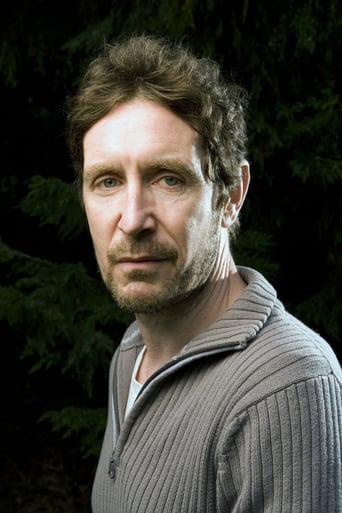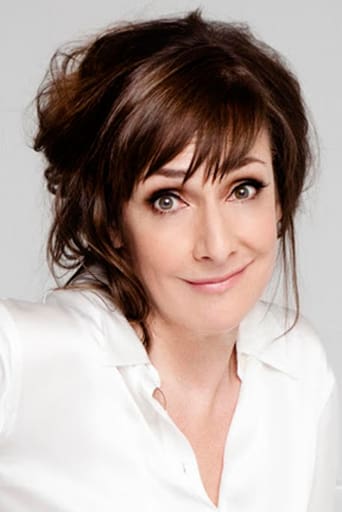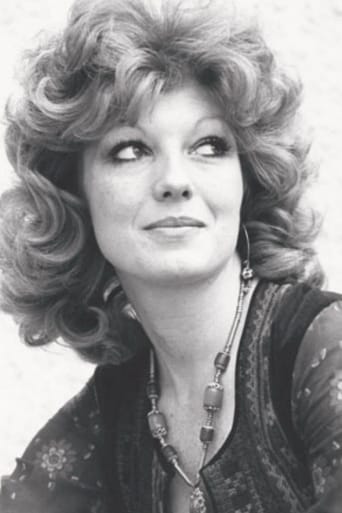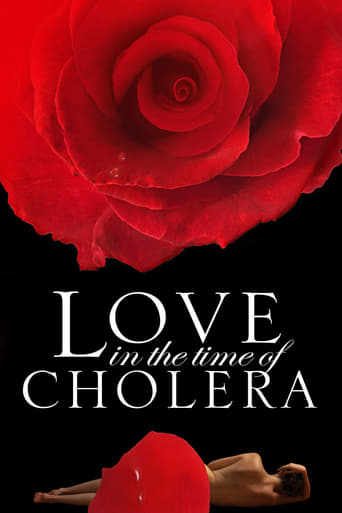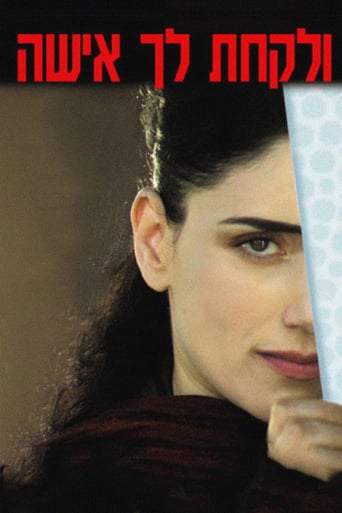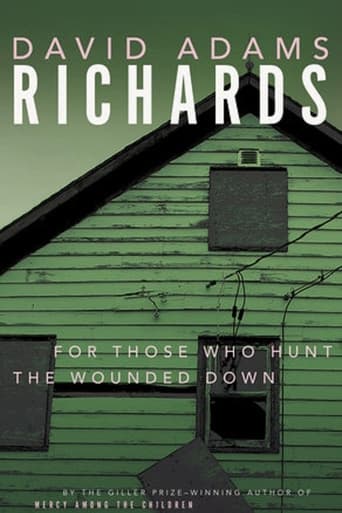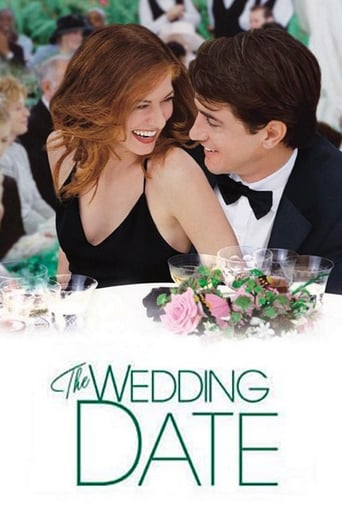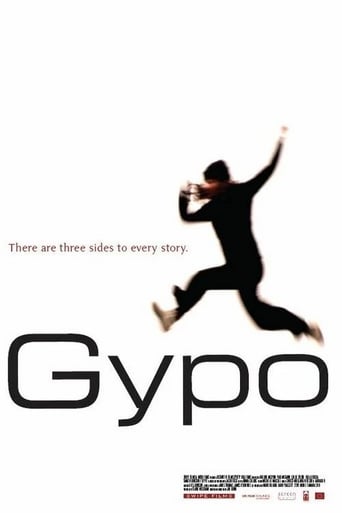

Gypo (2005)
Gypo is the story of a working class family in Margate, Kent, a town where immigrants have become the focus of most of the public's discontent. The film tells the story of the a couple of weeks in this family's life, beginning when a young Czech girl, Tash, comes to visit. The film is made in the Dogme95 tradition, so no costumes, no lighting, no props or sets, which gives the film a gritty texture appropriate to the story.
Watch Trailer
Cast
Similar titles
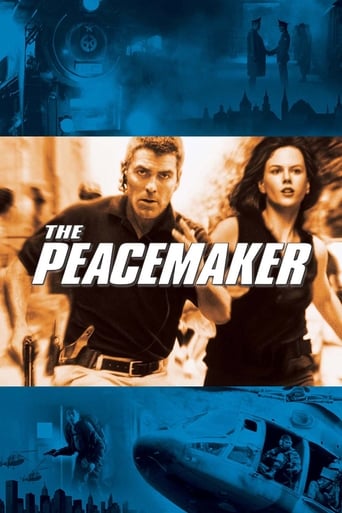
Reviews
I like the storyline of this show,it attract me so much
Redundant and unnecessary.
It's entirely possible that sending the audience out feeling lousy was intentional
I enjoyed watching this film and would recommend other to give it a try , (as I am) but this movie, although enjoyable to watch due to the better than average acting fails to add anything new to its storyline that is all too familiar to these types of movies.
I appreciate the artistic ambition that went into this film, but it comes out lacking in a number of ways. The subject matter is interesting and some of the acting really quite good, particularly the actress playing the mother. I also felt Tamzin's (daughter's) acting was better than some have given her credit for; she was playing the part of the grouchy teenager and she did it, in my opinion, well. However, here are my gripes, in no particular order: 1. One-dimensional characters, particularly the father. (He basically chomps a piece of gum and simmers with rage for the entire film). The problem didn't seem to be with the acting for the most part; it seemed more as though the plot left no room for nuance in any character except the Roma girl.2. Incredibly cliché dialogue. I'm actually relieved to read the dialogue may have been ad-libbed, because it's painful to think dialogue this trite could have gotten rubber-stamped before it went to the actors. "Did you ever really love me"... "it's over"... "you're an ass"... ugh. For an improvised acting exercise, sure... for a movie that's being screened at film festivals and distributed worldwide? No way.3. Time shifts, as delivered through the film editing, create much more confusion than they do intrigue. They're used at the expense of the tension that *would* build with a more linear editing technique. Some aspects NEVER seem to make any sense-- the continuity errors another reviewer referred to.4. A conclusion that makes you think "Huh? How does that make any sense?" and then, the next day, you're still thinking, "Huh?" The director has not done a good job in making the characters seem truly "backed into a corner" when they need to appear so; instead their choices seem inexplicable.5. Scene after scene, in the first half, in which the mother is on the phone, gracing the viewer with her one-sided, animated phone conversations. I started to feel like I was at a very uncomfortable lunch with a friend who wouldn't stop answering her freakin' phone. The phone dialogue is actually well-done and well-acted; there's simply way too much of it.It's surprising to me that many of these problems weren't noticed, or changed, before the final edit. At the end of the day, a lot of it is a suspension of disbelief problem, and I expect the director was hoping we'd care enough about the film and the subject to just go along for the ride. However, most viewers have a sharper eye than that.
I've given it 2, but even then I find it hard to justify such a high mark. I had high hopes for this film, having read reviews in which it was praised for presenting a refreshing and original take on the refugee/asylum issue. I'm sorry, but for me - a die-hard liberal who should have lapped up its messages - it simply didn't deliver. Stylistically, it was awful to watch: more goofs and blunders and continuity slips than I could count. The script was terrible: it seemed like a middle-class film-maker's idea of how working-class people speak and behave. It sounded like a workshop piece from a creative writing class. The characters didn't work, either. Not a single one of them was remotely believable - just a whole bunch of stereotypes. And despite a stellar cast, the acting was awful - which, I would guess, was largely to do with the direction, and not a little to do with the script. The whole thing failed to move me in any way - except when it came to ejecting the disc and taking it back to the shop.
This, the first undiluted Dogme production to be officially made in the UK, benefits right away from the use of tiny hand-held digi-cams, as quite a lot of the action takes place in the heroine's crowded council house or in the cramped trailer inhabited by two immigrants, Tasha (Chloe Sirene) and her mother Irina, played by the wonderful Rula Lenska. The council house is run by Helen (Pauline McLynn), who having raised her own two kids now has to mind her daughter Kelly's (Tamzin Dunstone) baby, while coping with a husband (Paul McGann) who has clearly lost his lust for life and believes he has been short-changed at the existential check-out. This situation is first explored from Helen's point-of-view: Kelly's college chum Tasha invited in for tea but having to put up with dad's railing against 'them immigrants, crowding into this tiny country and taking our jobs'. In this sequence, the family is fragmenting, several red herrings are chucked at us from the start, friendships are forged, the whole family throws itself into change, everyone tries to find their own way of surviving but it all seems to end in despair. Then we get it all again, from Paul's side. A natural reaction to this might be 'hold, enough!' - but now we get to see whence some of those herrings, and several more puzzlers are laid like booby traps, which may be opened eventually in the 'Tasha' story. Although there was no script, the overall structure, resembling a jigsaw being put together, must have been mapped out - it doesn't look as if it was all done in the cutting room. It works very well as a dark mystery edge-of-the-seat thriller; and just as well as an exploration of the forces of circumstance and the impulses that we employ (or imagine we employ) to deal with those forces. CLIFF HANLEY
Gypo (offensive slang for 'Gypsy') is a film that connects with the audience on the issue of racial tensions in a way that few films can. It does so by use of great British talent but more controversially using the 'Dogme' stylistic method of film-making. It explodes myths about refugees and exposes attitudes that need to be dealt with. It tells three sides to the same story, each with an equal intensity, and makes us care.The Dogme experiment was invented as a backlash tool against the formulaic approach of Hollywood movies where anything can be 'made' to look real given enough money and special effects to trick the audience. Dogme tries to go back to the basics of art in film by a self-imposed discipline of ten 'rules' known as the Vow of Chastity. These include no added effects (such as added music, sudden time and location shifts, superficial action such as murders) and using only hand held cameras and basic lighting. The point is to force the attention onto the abilities of the actors especially and not let the director off the hook with quick-fix technical solutions or dazzlements. (For the complete 'Vow', go here: http://www.dogme95.dk/the_vow/vow.html) Working under that sort of pressure, very many Dogme attempts have been failures, but the successes have been very noticeable. The sense of 'reality' is so acute that a relatively minor plot development can have immense impact.At one point as I watched the film, an understated emotion just hit me hard in the chest and brought tears to my eyes: one of the characters (Helen) has become friends with some Romany refugees who are being subjected to racial abuse. Making light of it ("They were going cheap in Asda"), she gives one of them a phone as a present, playing it down so as not to seem overprotective. I thought: I don't care if this is fiction or reality, that is a very real, poignant, caring, loving emotion she has just expressed. The film had connected with me in a way that went beyond suspension of disbelief, and it was worthwhile and uplifting to experience. A similar reaction happened as the plot explored more intense passions.Helen is in marriage to Paul that could be described a long-term but loveless, "Don't wake the baby up," he says to her gently as he takes his conjugal rights on her - against her will. Helen feels used. Paul is at his wits end from poverty in spite of hard work. He blames refugees for taking people's jobs (even though he doesn't think it below him to use them when he sees fit). Helen feels she just clears up the mess for everyone else, including her unmarried daughter and granddaughter. Her life has no point.Tasha, an attractive Romany Czeck refugee who wants to better herself, comes into their life, hoping to get a passport, citizenship and freedom things everyone else takes for granted. She is also in mortal fear of her Czeck husband and brothers who might come looking for her.I watched Gypo at the UK Premiere and so was very fortunate to be able to speak to the cast and crew briefly. I asked one of the actors if working under Dogme had been different. There was an intensity in his voice as he recalled it he said, you can't fake anything! Normally there is a point in the script where it might say, 'you killed someone' but of course everyone knows it's not real because people don't actually get killed in films. With Dogme, if you really can't do it, it isn't done. The effect is the audience buys in to what is being presented with a lot more trust. (All of the script in Gypo is improvised, although this is not a requirement of Dogme technique.) I asked Paul McGann (who plays Paul) further what advice he would give an actor planning to make a Dogme movie. He replied, "Get plenty of sleep!" then added on a more thoughtful note, "and have an open mind." Dogme looks pretty weird, but with results like Gypo it is hard to knock it, so have an open mind till you've seen it.Gypo produces a remarkably convincing look at a dysfunctional working class British family, with its goodness and badness, and it made me feel proud to be in a country that is producing such high quality, riveting cinema (and on such an incredibly tiny budget!) It unites art, gripping entertainment and responsible social comment in a way that few films aspire to and many less achieve. Director Jan Dunn cares about making movies in a way that shows integrity to the medium, responsibility within society, and a duty to give the audience every penny's worth of its ticket money. Her enthusiasm and skill provide a role model for aspiring filmmakers to emulate. For all its subject matter, Gypo is one of the most moving and joyous films I've seen recently and probably the best British film I've seen this year.
